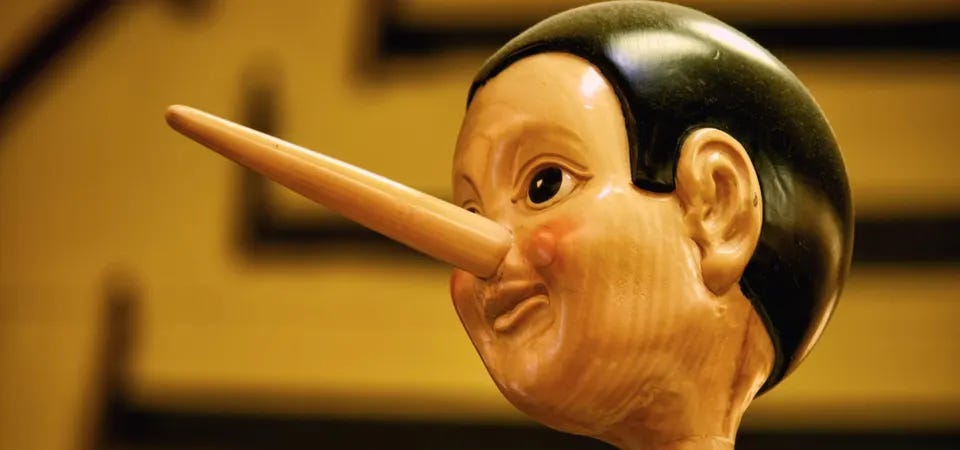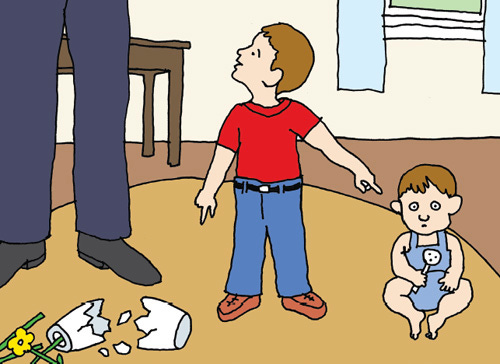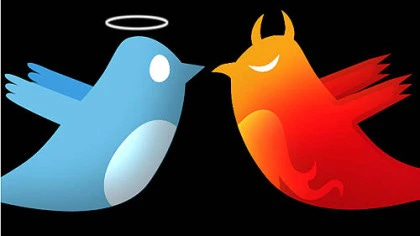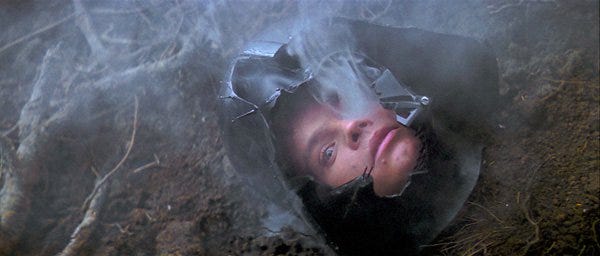Falsehoods, Lies and Deception as Symptom
What Carl Jung Taught Me About Our Age of Lies
I don’t know about you, but it’s hard to read/watch the news these days. I vacillate between the responsibility of being an informed citizen and taking care of my spirit. But there I was, last week watching lies cascade like a digital waterfall: false claims about vaccines and autism, dismissals of climate change, and conspiracy theories that would make my conspiracy-theory-loving college roommate blush.
Fortunately, it was my week for making dinner, and the kitchen duty called me into action. Focusing on meal prep, I wondered why we have become a society of lies and falsehoods, not to mention hatred and cruelty toward our fellow citizens. It’s more than one person, though leaders do bear responsibility for setting the tone. It’s bigger than an individual. We seem to collectively relish in various forms of bludgeoning one another, making S*!& up, and just plain deceiving ourselves. What a pair, hatred and lies?
I’m trying to think/act/write/pray collectively and individually. What’s our responsibility? What’s my responsibility?
Carl Jung’s words come to mind: “Unfortunately, there is no doubt about the fact that man is, as a whole, less good than he imagines himself or wants to be. Everyone carries a shadow, and the less it is embodied in the individual’s conscious life, the blacker and denser it is.”1 The Swiss psychiatrist never experienced Twitter or Facebook, but he lived through the horrors of the 1930s and 40s in Europe. His insights into the human psyche remain more relevant than ever in our age of disinformation.
The Lies We Tell Ourselves First
I’ve been studying Jung’s work for over thirty years now, ever since I encountered his ideas during my seminary training. Back then, I was convinced I had my psychological house in order. Ah, the naivete of youth. Jung taught me something unsettling: before we can understand why societies fall prey to collective deceptions, we need to reckon with the lies we tell ourselves.
In Modern Man in Search of a Soul, Jung observed that people often deceive themselves to protect their fragile egos. We suppress what we can’t face—our mortality, guilt, and our basic insignificance in the universe—and build elaborate illusions to hide the cracks in our identities. I learned this the hard way through my own psychological and spiritual journey, when I had to confront some uncomfortable truths about my motivations and blind spots.
Lies, Jung understood, serve as mental defenses. They’re not merely moral failures; they indicate deeper wounds we haven’t learned to heal or integrate into ourselves.
When Personal Evasions Go Public
Here’s where Jung’s insights become especially uncomfortable: political falsehoods are often personal evasions enlarged. Just as I might deny my own flaws or justify my harmful habits, societies develop collective stories to maintain a sense of innocence or superiority.
We Americans have long upheld stories of exceptionalism, often ignoring our histories of violence and inequality. In this light, collective lies—whether about systemic racism, climate change, or historical injustices—aren’t just cynical fabrications by manipulative leaders. They resonate because they reflect the evasions already part of our cultural psyche, the same ones that reside in our individual hearts.
The Shadow Finds a Screen
Jung warned that when we repress the shadow—those parts of ourselves we’d rather not acknowledge—they don’t disappear. Instead, they project outward onto others. What we refuse to face within ourselves, we cast onto external enemies.
You know this yourself. Just pause and think about the people you despise. What are their dislikeable qualities? Stubbornness, indecision, sloppiness. Make a list. Then ask yourself, could those be reflections of something about me?
This dynamic helps explain the intense level of conspiracy theories in our digital age. Those fantasies of secret groups and treacherous enemies might seem far-fetched, but they reveal deeper anxieties about loss, chaos, and meaninglessness that many people experience but can’t confront directly. The lies, even if irrational, serve as symbolic carriers of truths that are too painful to face head-on.
Conspiracy theories have a long history in the United States and other countries. Consider the numerous books and movies that depict a hidden cabal behind a master plot, whether it involves corporations, governments, religious groups, billionaires, or other entities.
As Jung described, symptoms are “attempts at self-cure.” Political lies, then, can be seen as collective symptoms—distorted efforts by society to address its psychic wounds without actually doing the difficult work of healing.
The Algorithm Amplifies Our Evasions
Jung expressed in The Undiscovered Self that modern mass society makes individuals vulnerable to propaganda, writing that “The bigger the crowd, the more negligible the individual.” He never could have imagined how the internet would turbocharge this dynamic.
In our algorithm-driven world, digital platforms not only spread lies—they also reward them. Echo chambers offer comforting illusions, shielding us from the discomfort of reality and strengthening the very evasions that made us vulnerable to falsehoods in the first place. The technology targets our psychological weaknesses with precise accuracy.
I’ve seen this happen in my own network of like-minded communities. We tend to seek out information that confirms our existing beliefs, while avoiding sources that might challenge our assumptions. It’s human nature, but our phones capitalize on this tendency for profit, creating feedback loops that make us more polarized and less able to confront uncomfortable truths.
The Uncomfortable Mirror
But here’s Jung’s most unsettling insight: the power of political falsehoods exposes our complicity. We accept lies because, at some level, we want to. We favor comforting myths over painful truths—that our consumption habits are destroying the planet, that our democracy is more fragile than we realized, that historical wounds haven’t fully healed, and that we might not be the heroes of our own stories.
Leaders may manipulate, but they only succeed because their lies align with our inner resistances. This is a hard truth to accept, especially for those of us who value being truth seekers. But Jung would say that until we recognize our own capacity for self-deception, we’ll remain vulnerable to deception from others.
A meaningful set of questions to ask ourselves: What lies do I tell myself? What uncomfortable truths do I avoid? The finger I point outward always points back at me.
The Path Through, Not Around
So, what’s the way forward? Jung’s approach wasn’t about moral scolding but about individuation—the lifelong journey of confronting the shadow, integrating what has been repressed, and moving toward greater wholeness. “The most terrifying thing is to accept oneself completely,” he admitted. Yet, such acceptance is the only way to live truthfully.
In our current crisis, resisting disinformation requires more than just fact-checking websites and implementing media literacy programs, even though these are essential. It requires citizens who are honest with themselves spiritually and psychologically—people willing to confront their own evasions.
Instead of only asking “Why do they believe lies?”, we should also ask “What in us longs to be deceived?” This is as much a spiritual challenge as a political one. It demands honest self-examination that most of us would rather avoid.
But,
By now, you might be thinking, “OK, I get it, but this is a really frightening time. Basic constitutional foundations are under attack, and there’s a real danger of a structural collapse of our democracy. Shouldn’t we put all our energy into addressing that problem?” I hear you, and I agree. I am actively involved in various ways, including writing letters, attending protests (see the opportunity on October 18 here), and volunteering for local organizations. We all need to be doing those things.
But I also believe we need to do the inner work. It’s necessary because, well, to quote a wise old saying, “we can’t give in to hate, it leads to the dark side.” Yet, who was it that Luke Skywalker discovered in that semi-dream sequence battle with Darth Vader? He unmasked his opponent and saw his own face. Don’t let that little Star Wars trivia diminish the point. Those first three films were all rooted in Joseph Campbell’s work, which was based on Jung’s ideas.
Harsh Teachers and Hard Grace
The work starts within each of us, in the quiet honesty of our own hearts. As Jung’s great associate, Marie-Louise von Franz, said: “The little open door of each individual’s inferior function is what contributes to the sum of collective evil in the world.”2 In other words, we all have shadow work to do. And by doing that work—facing our own capacity for self-deception—we help heal not only ourselves but also the world.
The truth will set us free. However, it will first make us very uncomfortable.
James Hazelwood is the author of “Ordinary Mysteries: Faith, Doubt & Meaning,” “Weird Wisdom for the Second Half of Life,” and “Everyday Spirituality.” His reflections on psychology, spirituality, and the human condition can be found at jameshazelwood.net.
Jung was a man of the Victorian era, writing in the early 20th century, so he used ‘man’ when referring to humanity. Rather than editing every one of his quotes, I leave them in the original German translation. However, the good news is that there is a project to update his collected works with a new translation.
From Her Lectures on Jung’s Typology, with chapters by James Hillman







Jim, I found this framing of our current situation both insightful and disturbing knowing it call me to look at my own deceitfulness. I also could not help but think of your love of photography which is the art of understanding perspective, light and shadows. Have you made the connection between Jung and photography or is it too obvious.
GREAT REFLECTION ON JUNG.....EASY TO UNDERSTAND.